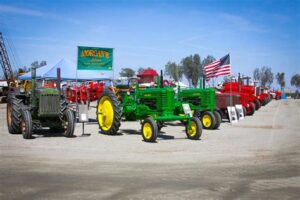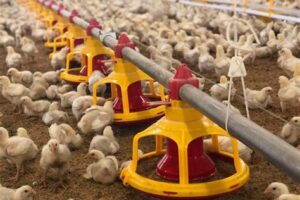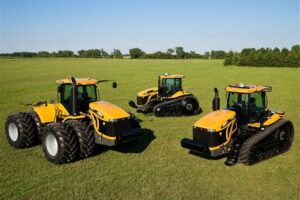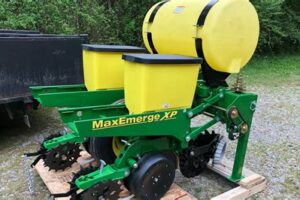Table of Contents
Looking for efficient and convenient farming practices? Explore the world of remote control farm equipment. Enhance productivity and reduce labor costs with advanced technology that allows you to operate machinery from a distance. Discover how remote control technology can revolutionize your agricultural operations and improve overall efficiency.
Remote control farm equipment has revolutionized the way farmers carry out their daily operations. With cutting-edge technology and advanced features, these innovative machines have become indispensable tools in modern agriculture. Gone are the days of labor-intensive manual labor; instead, farmers can now efficiently control their farming equipment from a distance, optimizing productivity and minimizing physical strain. Whether it’s plowing fields, sowing seeds, or harvesting crops, remote control farm equipment offers a level of convenience and precision that was once unimaginable. In this article, we will explore the incredible benefits of this game-changing technology and how it has transformed the agricultural industry.
The Advancements in Remote Control Farm Equipment
In recent years, the agricultural industry has witnessed significant advancements in technology aimed at improving efficiency and productivity. One such development is the emergence of remote control farm equipment. This cutting-edge technology allows farmers to operate machinery from a distance, offering a range of benefits that were previously unimaginable. From increased safety to enhanced precision, remote control farm equipment is revolutionizing the way farmers approach their work.
Enhanced Safety
Safety is paramount in any industry, and farming is no exception. Remote control farm equipment offers a significant improvement in terms of safety for farmers. By allowing operators to control machines from a distance, they can avoid potential hazards and reduce the risk of accidents. This is particularly important when working with large and heavy machinery, where even the smallest mistake can have severe consequences. With remote control technology, farmers can ensure their well-being while still achieving optimal results.
Improved Efficiency
Efficiency is a key factor in the success of any agricultural operation. Remote control farm equipment enables farmers to streamline their workflows and make better use of their time. With the ability to operate multiple machines simultaneously, operators can cover more ground and complete tasks in a fraction of the time it would take otherwise. This not only increases productivity but also allows farmers to allocate their resources more effectively, ultimately leading to better yields and profitability.
Increased Precision
Precision is crucial in modern farming practices, as it directly affects crop yield and resource utilization. Remote control farm equipment offers unparalleled precision in various farming activities, such as planting, fertilizing, and harvesting. Operators can precisely control the speed, direction, and depth of equipment, ensuring that each task is executed with utmost accuracy. This level of precision minimizes wastage and optimizes resource allocation, resulting in higher crop yields and reduced environmental impact.
Remote Monitoring and Diagnostics
Another significant advantage of remote control farm equipment is the ability to monitor and diagnose machinery remotely. Through advanced sensors and telemetry systems, operators can receive real-time data about the performance and condition of their equipment. This allows for early detection of potential issues and proactive maintenance, reducing downtime and costly repairs. By staying informed about the status of their machines, farmers can maximize operational efficiency and minimize disruptions to their workflow.
Adaptability to Challenging Terrain
Farming often involves working on challenging terrain, such as steep slopes or uneven ground. Remote control farm equipment is designed to navigate such terrain with ease, thanks to advanced stabilization and control systems. Operators can remotely maneuver machinery in difficult conditions without putting themselves at risk. This adaptability ensures that no land goes unused due to its topography, opening up new possibilities for farmers and expanding the potential of their operations.
Integration with Precision Agriculture
Remote control farm equipment seamlessly integrates with precision agriculture technologies, further enhancing its capabilities. By combining remote control with GPS and other precision tools, farmers can achieve even higher levels of accuracy and efficiency. This integration allows for precise mapping, variable rate application, and automated guidance, all of which contribute to optimized farming practices. The synergy between remote control and precision agriculture empowers farmers to make data-driven decisions and maximize their return on investment.
Cost Savings
The adoption of remote control farm equipment can lead to significant cost savings for farmers. By improving efficiency, reducing downtime, and minimizing resource wastage, operators can optimize their input costs and maximize their output. Additionally, the enhanced safety features of remote control technology reduce the risk of accidents and potential financial losses associated with machinery damage or operator injuries. Over time, these cost savings contribute to the long-term sustainability and profitability of farm operations.
Environmental Sustainability
Remote control farm equipment aligns with the growing emphasis on environmental sustainability in agriculture. The precise control over machinery allows for targeted application of inputs, such as fertilizers and pesticides, minimizing their usage and reducing the environmental impact. Furthermore, the integration with precision agriculture technologies enables farmers to implement sustainable practices like conservation tillage and controlled traffic farming. By combining efficiency with eco-consciousness, remote control farm equipment contributes to a more sustainable and environmentally friendly agricultural sector.
The Future of Farming
The rise of remote control farm equipment represents a significant step forward in the evolution of modern farming practices. As technology continues to advance, we can expect further innovations and refinements in this field. The integration of artificial intelligence and machine learning algorithms holds the potential to make remote control farm equipment even more intelligent and autonomous, further enhancing its efficiency and effectiveness. With each new development, the future of farming becomes more promising, offering unprecedented opportunities for farmers to thrive in an ever-changing world.
Remote Control Farm Equipment: Enhancing Efficiency and Precision
Farming is an industry that has greatly benefited from advancements in technology. One such advancement is the development of remote control farm equipment, which has revolutionized the way farmers operate their machinery. Through the use of remote-controlled tractors, sprayers, harvesters, irrigation systems, drones, feeding systems, soil sampling equipment, and farming systems, farmers can now enhance efficiency and precision in their daily operations. This article explores how remote control farm equipment is transforming the agricultural landscape and improving productivity.
1. Increasing Productivity through Remote-Controlled Tractors
Remote control farm equipment, particularly tractors, offers farmers the ability to operate machinery from a distance, minimizing risks and improving productivity. With the use of remote-controlled tractors, farmers can effortlessly handle tasks such as plowing, planting, and harvesting with greater efficiency and precision. This technology reduces manual labor requirements, allowing farmers to save time and resources while achieving optimal results.
2. Precision Agriculture Made Possible with Remote-Controlled Sprayers
Precision agriculture is essential for maximizing crop health and minimizing environmental impact. Remote-controlled sprayers enable farmers to achieve precise and targeted chemical application, reducing the use of pesticides and improving crop health. By remotely controlling these sprayers, farmers can identify specific areas in need of treatment, ensuring minimal waste and maximum effectiveness. This level of precision leads to better overall yields and contributes to sustainable farming practices.
3. Enhancing Safety with Remote-Controlled Harvesters
Harvesting crops can be a hazardous task, often requiring direct human intervention. However, the use of remote-controlled harvesters greatly improves the safety of farmers by reducing the need for close proximity during operations. With remote control capabilities, farmers can guide the harvester remotely, minimizing the risk of accidents and injuries. This technology not only enhances safety but also increases efficiency in the harvesting process, resulting in improved productivity.
4. Efficient Irrigation Systems through Remote-Controlled Pivots
Water is a precious resource in agriculture, and its efficient usage is crucial for sustainable farming. Remote-controlled pivot irrigation systems provide farmers with greater control over water distribution, contributing to water conservation and increased crop yields. By remotely monitoring and adjusting the flow of water, farmers can ensure optimal irrigation, leading to healthier plants and efficient water usage. This technology is particularly important in regions with water scarcity, where every drop counts.
5. Optimizing Crop Monitoring with Remote-Controlled Drones
Crop monitoring plays a vital role in identifying potential issues, detecting crop health problems, and gathering data for precision farming. Remote-controlled drones equipped with cameras and sensors offer farmers a powerful tool for monitoring their crops. From aerial surveillance to monitoring crop growth, remote-controlled drones provide real-time information that allows farmers to make data-driven decisions and address problems promptly. This technology enables farmers to optimize crop management strategies and maximize yields.
6. Streamlining Livestock Management with Remote-Controlled Feeding Systems
Livestock management involves accurate and timely feeding, waste reduction, and maintaining herd health. Remote-controlled feeding systems streamline these processes by allowing farmers to remotely adjust feed portion sizes and distribution times. This level of control caters to individual animal needs and optimizes overall performance. By reducing waste and ensuring proper nutrition, farmers can enhance efficiency in livestock management and ultimately improve profitability.
7. Enhanced Soil Management through Remote-Controlled Soil Sampling
Soil health is a critical factor in crop growth and overall farm productivity. Remote-controlled soil sampling equipment enables farmers to remotely collect soil samples from various locations across their fields. This data aids in fertilizer application and soil health management. With precise soil data accessible through remote control, farmers can implement customized fertilization strategies, leading to better nutrient management and improved yields. This technology empowers farmers to optimize soil health and maximize crop productivity.
8. Real-Time Data Monitoring with Remote-Controlled Farming Systems
Real-time data monitoring is essential for informed decision-making in agriculture. Remote-controlled farming systems provide farmers with real-time information on factors such as crop growth, soil moisture levels, and weather conditions. By remotely accessing this data, farmers can make informed decisions, adjust farming strategies, and respond effectively to changing conditions. This technology ultimately improves overall farming outcomes by allowing farmers to optimize resource allocation and maximize productivity.
In conclusion, remote control farm equipment is revolutionizing the agricultural industry by enhancing efficiency and precision. Through remote-controlled tractors, sprayers, harvesters, irrigation systems, drones, feeding systems, soil sampling equipment, and farming systems, farmers can achieve increased productivity, improved crop health, enhanced safety, efficient water usage, optimized livestock management, better soil health management, and real-time data monitoring. The adoption of remote control farm equipment is a game-changer for farmers, enabling them to embrace technology and achieve sustainable and profitable farming practices.
Remote Control Farm Equipment: A Game-Changer in Modern Agriculture
Advancements in technology have revolutionized various industries, and agriculture is no exception. The introduction of remote control farm equipment has significantly transformed the way farming operations are conducted. With its ability to improve efficiency, productivity, and safety, this innovative technology has become an invaluable asset for modern farmers.
- Increased Efficiency: Remote control farm equipment allows farmers to complete tasks with greater precision and speed. By eliminating the need for manual labor, it minimizes the time and effort required for various farming operations. Whether it is plowing, seeding, or harvesting, these machines can be controlled remotely, enabling farmers to cover larger areas in a shorter span of time. This increased efficiency translates into higher productivity and ultimately boosts the overall profitability of farming operations.
- Enhanced Precision: Precision plays a crucial role in modern agriculture, and remote control equipment excels in this aspect. Farmers can remotely control and monitor every movement of the equipment, ensuring accurate placement of seeds, fertilizers, or pesticides. This precision not only maximizes crop yield but also minimizes resource wastage. By precisely targeting specific areas, farmers can optimize the use of inputs, reducing costs and environmental impact.
- Improved Safety: Farming can be a hazardous occupation, with various risks associated with heavy machinery and manual labor. Remote control farm equipment mitigates these risks by allowing farmers to operate machines from a safe distance. This eliminates the need to physically be on the equipment, minimizing the chances of accidents or injuries. Additionally, these machines often come equipped with advanced safety features and sensors, further enhancing the overall safety of farming operations.
- Flexibility and Adaptability: Remote control farm equipment offers farmers the flexibility to adapt to changing conditions or unexpected challenges. With the ability to control multiple machines simultaneously, farmers can respond quickly to varying weather conditions or crop requirements. This adaptability enables them to make timely decisions and optimize farming practices, ensuring maximum crop yield and profitability.
- Access to Data and Analytics: Many remote control farm equipment systems come equipped with advanced sensors and data collection capabilities. This provides farmers with valuable insights into various aspects of their farming operations, such as soil moisture levels, crop health, and machinery performance. By analyzing this data, farmers can make data-driven decisions, optimize resource allocation, and implement precision farming techniques to further improve overall efficiency and productivity.
Overall, remote control farm equipment has revolutionized the agricultural industry, offering numerous benefits to modern farmers. Its ability to enhance efficiency, precision, and safety, coupled with its adaptability and access to valuable data, makes it an invaluable tool for optimizing farming operations. As technology continues to evolve, we can only expect further advancements in remote control farm equipment, further revolutionizing the way agriculture is practiced.
Thank you for visiting our blog and taking the time to learn more about remote control farm equipment. We hope that our articles have provided you with valuable insights and information about this innovative technology. As you may have discovered, remote control farm equipment offers numerous benefits and opportunities for farmers, enabling them to optimize their operations and improve efficiency. In this closing message, we would like to summarize some of the key points discussed in our blog and leave you with a final thought.
First and foremost, remote control farm equipment provides farmers with the ability to control and monitor their machinery from a distance. This technology allows them to operate tractors, harvesters, and other equipment remotely, reducing the need for manual labor and increasing productivity. With the use of advanced sensors and GPS technology, farmers can ensure precise and accurate movements, resulting in improved crop yields and reduced waste.
Furthermore, remote control farm equipment enables farmers to work more safely and comfortably. By operating machinery from a remote location, farmers can avoid exposure to hazardous conditions and potentially harmful substances. This is particularly important when dealing with chemicals used in crop treatment or when working in extreme weather conditions. Additionally, remote control technology reduces physical strain on farmers, allowing them to perform tasks from a comfortable and ergonomic position.
In conclusion, remote control farm equipment represents a significant advancement in the agricultural industry. It offers farmers the opportunity to streamline their operations, increase productivity, and improve safety. This technology allows for efficient control and monitoring of machinery, leading to better crop yields and reduced waste. We believe that remote control farm equipment will continue to evolve and play a crucial role in shaping the future of farming. Thank you once again for visiting our blog, and we encourage you to stay updated with the latest developments in this exciting field.
Video Remote Control Farm Equipment
People also ask about Remote Control Farm Equipment:
What is remote control farm equipment?
Remote control farm equipment refers to agricultural machinery and vehicles that can be operated from a distance using remote control technology. These devices allow farmers to control and maneuver various farming equipment without the need for physically being present in the vehicle or operating it manually.
What are the benefits of using remote control farm equipment?
Using remote control farm equipment offers several advantages:
- Improved safety: Farmers can operate machinery from a safe distance, reducing the risk of accidents and injuries.
- Increased efficiency: Remote control allows for precise and accurate movements, resulting in improved productivity and reduced wastage.
- Time-saving: Farmers can control multiple machines simultaneously, saving time and effort.
- Cost-effective: Remote control technology eliminates the need for additional personnel to operate equipment, reducing labor costs.
What types of farm equipment can be operated remotely?
A wide range of farm equipment can be operated remotely, including:
- Tractors
- Harvesters
- Sprayers
- Fertilizer spreaders
- Seeders
- Livestock handling equipment
- Irrigation systems
- Robotic milking machines
Is remote control farm equipment easy to use?
Yes, remote control farm equipment is designed to be user-friendly and easy to operate. Manufacturers provide intuitive controls and interfaces that allow farmers to quickly learn and adapt to the remote control system. Additionally, training and support are usually provided to ensure farmers can effectively utilize the equipment.
What is the future of remote control farm equipment?
The future of remote control farm equipment looks promising. Advancements in technology, such as the integration of artificial intelligence and autonomous capabilities, are expected to further enhance the capabilities of remote-controlled agricultural machinery. This could lead to increased automation, improved precision farming techniques, and enhanced overall efficiency in the agriculture sector.






